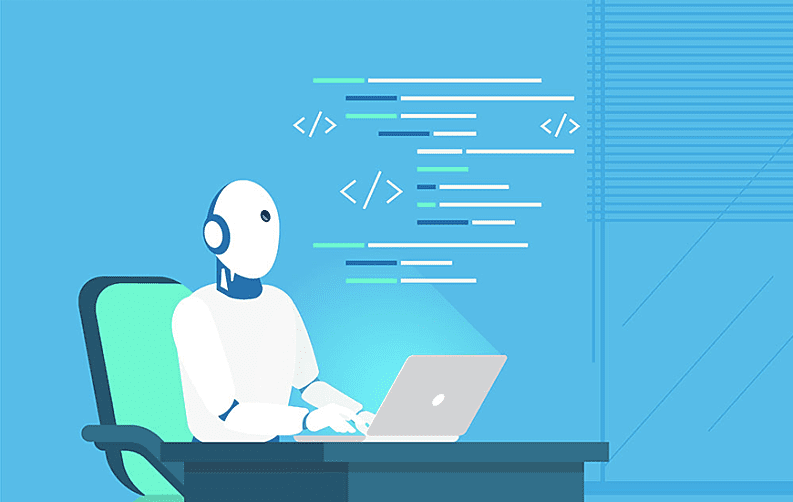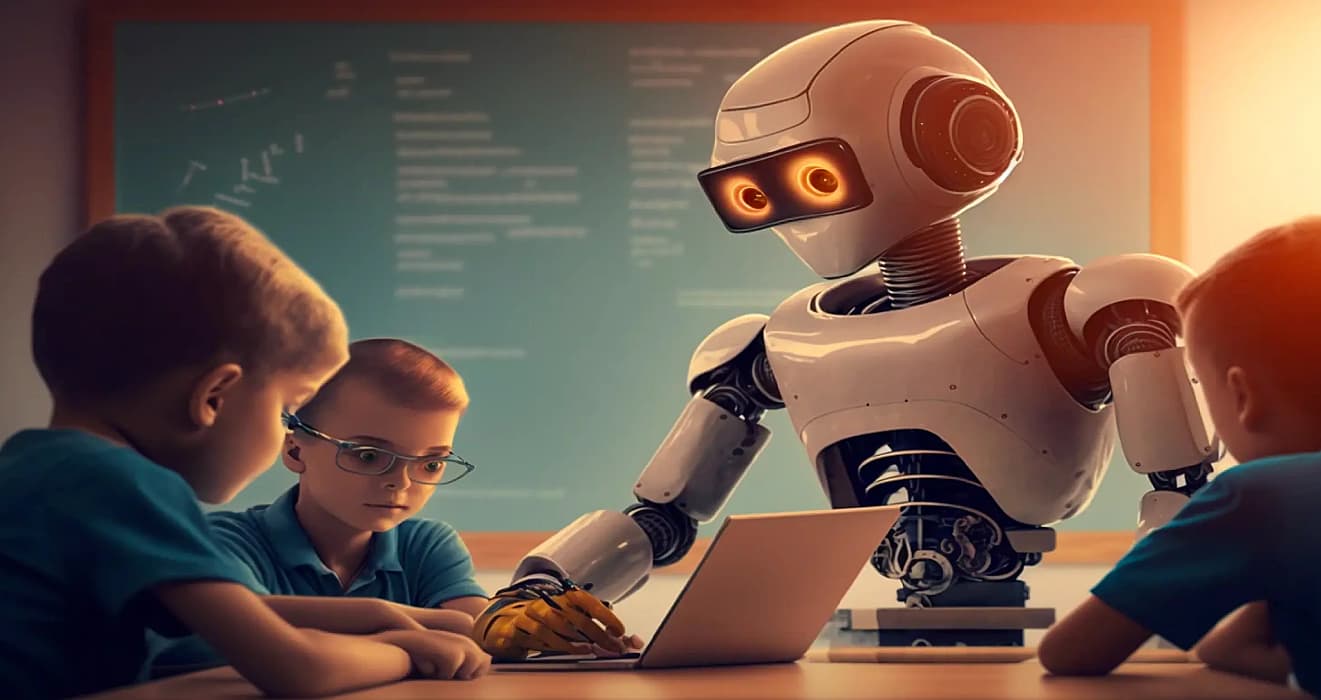
- AI in the Education Sector | An Overview
- Use Cases of AI Technology in Education | Real-World Examples
- Role of Artificial Intelligence in the Education Industry
- What is the cost of implementing artificial intelligence in education?
- Importance of Artificial Intelligence in the Education Industry
- What is the use of AI in Education? - Applications of AI in Education
- Understanding the evolution of AI technologies in the education sector
- What are the key performance indicators of AI in education?
- Best AI Tools for Education
- Risks of AI in Education
- What’s Next? Future of AI in Education and Concluding Words!

The integration of Artificial Intelligence in Education marks a significant leap forward in transforming traditional teaching methods. As we navigate through the 21st century, the educational landscape is reshaped by innovative AI capabilities. This rapidly evolving technology has the potential to transform the ways of teaching and learning.
It won’t be wrong to say that the education sector has been providing information that we’ve been aggregating for 200,000 years (age of human society). Education marks multiple disciplines that let us explore different facets of life to create, build, and sustain. However, it's neither accessible to every last human, nor its quality always has the capacity to engage students. Engagement that keeps the learner hooked.
To solve this problem, AI in education is introduced and utilized effectively for numerous use cases in the industry. Therefore, let’s explore what artificial intelligence in education is and what can it accomplish.
AI in the Education Sector | An Overview
Technology has always played an important role in the educational secretary. However, its current use is more prevalent than ever. AI technology in education is used to enhance educational processes, learning outcomes, and streamline administrative operations.
It includes a broad spectrum of use cases. From automating routine tasks to facilitating a personalized learning experience and enabling adaptive outputs. This technology is yet to be understood and adopted fully by the sector. However, many institutions and children are using AI and reaping the benefits.
As per Statista’s analysis, the average number of edtech tools accessed by US schools reached over 2500. Most teachers and students believe in the positive impact of AI in education and have accepted it as the flag barrier to modernization in education.
Use Cases of AI Technology in Education | Real-World Examples
The education industry has witnessed a transformative impact with the inclusion of AI in online education. E-learning platforms are competing with traditional teaching methods to offer improved learning experiences.
There are several use cases demonstrating real-world implementation and advantages of AI in education. We have listed some prominent examples for the same.
1. Knewton (A part of the Pearson group)
Knewton offers an adaptive learning platform for all teachers and students. It personalizes the educational content based on the learning style and potential of each student. The platform uses AI technology to adjust the difficulty level and suggests resources tailored to student-specific needs.
2. Dream Box Learning
Dream Box offers math learning programs for school students. It is primarily targeted towards K-8 students. The platform harnesses AI in education to adapt the curriculum to student’s learning pace and compatibility.
3. Carnegie Learning
This platform facilitates an Intelligent Tutoring System by integrating artificial intelligence in education. It is primarily a math learning software that uses cognitive science and AI to offer personalized tutoring. It also facilitates real-time feedback, aiming to mimic the human tutor’s effectiveness.
4. Duolingo
Duolingo is a popular AI-based learning platform that facilitates quick and simple language learning. The platform employs AI to tailor language learning courses for students. It optimizes the learning plans and practice worksheets to maximize learning efficiency.
5. Jill Watson
It is an AI-powered virtual teaching assistant platform that answers student questions quickly. It is aimed at stimulating human-like interactions to support learning outside of the traditional classrooms.
Role of Artificial Intelligence in the Education Industry
AI in the education sector is poised to have a similar impact as it is having on the rest of the industries in this dynamically evolving world. In the next couple of years, the old and dogmatic ways of learning will eventually vanish. The future of AI upholds multiple promises, such as:
1. Personalization of education for students
Using AI in school education can personalize content for all students. The curriculum can be adjusted based on the student’s pace of learning and capabilities. AI systems may tailor content, provide appropriate learning paths, and modify task difficulty levels in real-time by assessing data on students' learning patterns, performance, and preferences.
2. Gamification of complex concepts
One of the primary benefits of AI in education is that it promotes the development of educational games. simulations that adapt to the learner's abilities, making learning more dynamic and entertaining. These technologies can model complicated real-world scenarios in science, history, and mathematics.
3. Adaptive learning for different learning styles
The application of AI in education can tailor learning content to each student's development and success. They ensure that pupils are not bored with too-easy tasks or overwhelmed by too-difficult ones, thereby maintaining their engagement and motivation.
4. Administrative Task Automation
AI improves administrative efficiency by automating operations like scheduling, enrollment, and reporting. This efficiency enables educational institutions to more effectively deploy resources while focusing on improving the educational experience.
There are numerous challenges that can be solved with the implementation of AI in the education industry. It can provide a custom-made curriculum as per the student's requirements. AI for education can enable the use of technologies like augmented reality and virtual reality. It can provide experiential learning to the students to understand complicated concepts of physics, chemistry, mathematics, etc., with ease.
Unlike the traditional education system which at times burdens the students with education loans, the use of AI in the education sector can reduce this financial burden dramatically. This can be done, among other things, by providing various affordable courses that are prepared using AI engines.
What is the cost of implementing artificial intelligence in education?
As per the Global Market Insights, the investments in AI and Edtech are expected to grow to $30 Billion by the year 2032. While the initial investments in using AI for education can be high, it can save institutes money in the long run. Implementing tools powered by AI in the education industry can significantly reduce the administrative cost and improve overall efficiency.
Some factors that can affect the cost of implementing AI applications in education are listed below.
- Type of AI solution to be implemented in the classrooms
- The scale of implementing the AI solution
- Integrating the AI solutions into the existing AI systems
- Cost of support and maintenance
- Cost of training and professional development
Importance of Artificial Intelligence in the Education Industry
With compelling use cases that AI can serve, AI for education has a massive role in enhancing its reach, quality, and customization as per the requirements.
To add to this idea further, there are several things that artificial intelligence in education can do for students. These are:
- Artificial intelligence in education can unlock new modes of communication with students. An AI is capable of generating automated translations of languages and hand gestures. In fact, AI can heavily help in communicating with specially-abled children
- No two students are similar. In fact, the way people learn is also very different. An AI can provide insights to the teachers and lecturers to customize their learning such that it is easily understandable by each and every student in the classroom
- AI has the capability to morph the style of learning by constantly getting responses from the students. An AI will try to suit itself as per the student's accord and guide him/her at every step of the way
- AI can constantly provide suggestions to improve the learning process and provide relevant resources that can improve it
- AI can be used to create tools for educators that can help them in order to improve their teaching process and engage better with their students
What is the use of AI in Education? - Applications of AI in Education
With the inclusion of artificial intelligence in education, there are multiple problems that can be fixed. While using AI in the education sector, teachers and educators can come up with compelling new ways of teaching thus easing out multiple bottlenecks in the education industry.
Therefore without wasting any time, let’s check out some of the applications of AI in the education industry:
1. Grading the papers
In many schools and universities, students are given options for answers using an OMR (optical mark recognition) sheet. These sheets usually have four options that can be scanned through a printer and run through an AI to detect the correct answer.
In addition, if the students are asked subjective questions, an AI model can be developed to assess the accuracy of the answer. It will pick all the important phrases from the answer and, based on that, can provide relevant scoring to the students.
Furthermore, the more that AI model is used along with teachers providing intervention (to check the accuracy of the scoring), the better the AI model will become over time. In fact, in the near future, the AI model might become autonomous with time, thereby providing full autonomy while grading the students.
2. Individualized learning
Learning gets more individualized and student-focused; that’s why it makes education today better and a lot more functional. With AI being an assistant teacher, teachers can create the best individualized curriculum for every student.
It works and changes every time the program sees a flaw, giving students additional questions about harder topics, hints for answers and creating a perfect pace of studying.
3. Tutoring
For now, technology tutoring is not perfect, but AI can already help kids or the ones grabbing a new subject to learn with basics, making it possible to not involve real living teachers at the beginning of the process.
Of course, technology can’t make an interesting and creative studying course as a human professional, but it still rids students of using writers from essayontime when they don’t have time for real tutors. Year after year, AI is developing and giving us a glimpse of how it can help students.
4. Failing and receiving grades
It’s always scary to be put on the spot and get judged by your teacher or classmates when you get low scores on a test or essay. With better education, AI tutoring, and a grading system, it won't be as intimidating to get your tests checked and receive the grades. In fact, the grades can be personally sent to the students via email, thereby saving them from embarrassment and saving their confidence.
Moreover, it can help students build the courage to study and express themselves more when they want to test their knowledge and coping skills.
5. Accessible Education
When you have so many things to experience on the internet, it also gives you huge possibilities, like educating yourself and even getting a degree online. With a list of web courses and even universities available online, it’s not a surprise to receive a diploma, even if you’ve never visited your university building.
Most important is that it’s helping in improving education for those who are not fluent in certain languages or have hearing or visual impairments. For example, some programs can create subtitles for the ongoing lecture right in the classroom.
6. Content Creation
The tragedy with education is that even with traditional books and other resources, the process is boring and monotonous. Think about this for a second, lessons from history are practically stories, however, there are so many students who constantly get distracted by what’s going around them during the lesson.
With the application of AI in education, educators will be able to create presentations, images, and even videos with ease in the future. The inclusion of AI will enable ease of learning via different types of content and make sure that the classroom becomes as much interactive as possible.
7. Bridging the Skill Gap
The application of artificial intelligence in education is not limited to school or university students; instead, it can be applied to corporate training as well. A GPT -3-enabled tool that has been trained in a specific industry can engage its users by training them with the necessary skills. Also, the great aspect of this would be that it’ll all be conversational.
8. Feedback Based on AI Insights
An AI-based feedback system that processes the daily data can provide relevant feedback. This feedback can be used to figure out the strengths and weaknesses of an individual using the system. In fact, the system can use that feedback and create a step-by-step how-to guide to work with its students.
Understanding the evolution of AI technologies in the education sector
The evolution of AI in school education reflects a journey from simple automated tools to sophisticated systems facilitating personalized learning. We can understand the progressive implementation of AI use cases in education through different stages.
Let’s discuss them in detail.
1. Early AI tools shaping the future of learning
In the past few years, AI has gradually been integrated into the education system. Researchers began exploring the potential of computers to enhance teaching and learning. With CAI, educators used the technology to deliver instructions. CAI or Computer-Assisted Instruction delivered educational content without the adaptive capabilities of modern AI.
2. AI in Action and its impact today
The early 2000s marked the introduction of adaptive learning systems. Modern AI applications in education use algorithms to adjust the difficulty level of tasks based on user performance. This period also marks the integration of Intelligent Tutoring Systems (ITS). These were designed to offer personalized learning.
Furthermore, machine learning algorithms were developed to facilitate detailed data analysis. Educational institutions began to use machine learning algorithms to analyze data on student performance, engagement, and learning patterns.
3. Rising trends and predictions for artificial intelligence in education
As AI for education continues to advance, the future of AI in education holds great potential for more innovations in the industry. Some of the trends and predictions that can change the course of teaching are listed below.
- Increased use of AI chatbots for education in schools
- Use of AI in education to facilitate special learning and personalized support
- Implementing AI and augmented reality in education offers hands-on experience in a virtual environment
What are the key performance indicators of AI in education?
KPIs for artificial intelligence in education are critical for assessing the efficacy, efficiency, and benefits of AI in education.
These metrics assist educational institutions in determining if AI tools are reaching their aims and favorably impacting educational outcomes. Here are some key KPIs to measure the accuracy of AI for education.
1. Student management metrics
- Time on Task: This metric measures how much time students spend interacting with AI-powered learning tools, which indicates their level of engagement.
- Interaction Rate: Keeps track of how frequently you engage with the AI system, such as when you ask questions, complete tasks, or access modules.
2. Learning outcomes
- Grade Improvement: Evaluate the influence of AI tools on learning by comparing student performance before and after their use.
- Assessment results: Tracks changes in results on standardized tests or assessments to determine learning development.
3. Personalization effectiveness
- Learning Path Adaptation: Assesses how successfully AI systems tailor learning paths to individual students' needs and learning styles.
- Content recommendation Accuracy: Determines the relevancy and usefulness of the content recommended by AI to learners.
4. Accessibility and inclusion
- Access Rates: Monitors the use of AI technologies by diverse student demographics, including those with disabilities, to ensure fair access.
- Engagement Levels in Underrepresented Groups: Tracks engagement and performance measures for traditionally underrepresented or disadvantaged student groups.
5. Scalability and adoption
- Adoption Rate: Indicates the rate at which AI tools are being used across different courses, departments, and institutions.
- Scalability Metrics: Evaluates AI systems' ability to handle increasing numbers of users and data volume while maintaining performance.
Best AI Tools for Education
AI has been r transforming the entire education sector. Right now, there are so many tools that use AI in order to ease the work of teachers and make learning more fun for students.
AI has already started to transform the education sector. As time advances, we see more and more AI-based tools in the education industry. Tools that are beneficial for both students and teachers alike.
Here is a list of some of the apps that one can get help of, in terms of education:
- Gradescope
- Knewton’s Alta
- Knowji
- Ivy.ai
- Fetchy
- Caktus AI
Risks of AI in Education
There is no doubt that AI has numerous benefits and applications. The limitation is simply the imagination. However, there are several risks associated with technology.
To further extrapolate, these are some of the risks associated with prolonged usage of AI for educational purposes.
1. Digital Divide amongst Students
With AI becoming the norm, every student who is a part of the ecosystem will become a problem for the ones who don’t have access to it. See, AI is being implemented in almost every facet of life.
This includes multiple industries, our capability to find data (ChatGPT, Google Bard, etc.), and ease of completing tasks in general. With AI becoming so omnipresent, the students who don’t have access to AI will lag behind.
2. Bias AI Models
The AI model used to create AI tools for education uses data that is generated by humans. The problem here is that this data can be biased which further ends up training the AI system.
For instance, ChatGPT has been trained on a whole range of data that includes an informative website and a whole range of resources. Therefore, the makers behind the platform themselves suggest to cross-verify the facts provided with a trustworthy source.
3. Skill Gaps
Not everyone in the education industry is well-versed in AI technology. All the app entrepreneurs, startups, and established organizations that are coming up with AI solutions have tried to ease the process of using their apps. However, the process of dealing with an AI system can be a lot for many teachers and students from remote area backgrounds. For instance, teachers who are dealing with old age might find it difficult to comprehend AI-based educational tools.
4. Reduced Creativity
With so much ease in creating content, users often tend to lose their creativity with the integration of AI. This is the case with every niche. The moment a process has been eased out and there is a replacement that can do the heavy lifting, the creativity of the user decreases. In order to stay creative, we need constant challenges. On the other hand, with artificial intelligence in education, the entire process is automated, and often times the presence of a human is simply participatory. A great example of this would be writers using ChatGPT for creating content often losing the capability to construct an article simply by themselves.
What’s Next? Future of AI in Education and Concluding Words!

Obviously, with a bunch of new technologies coming our way, both positive and negative changes in our lives are inevitable. Even if AI can’t completely substitute all teachers in the classroom yet, it has already become an amazing opportunity for everyone who's a part of the educational process.
It doesn’t matter if it’s inside or outside the basic classroom; it’s amazing how far it has come. AI technology can create courses and curricula, it can help people learn and write papers, and it can already check those tasks on a basic level.
Who knows, maybe sooner or later classrooms will look like old movies and cartoons about the future, and students will be surrounded by human-looking androids only.
Frequently Asked Questions
-
How can AI be used in education?
AI can be used in education to personalize learning experiences, automate grading, provide quick feedback, assist with administrative work, increase engagement through interactive technologies, and provide insights through data analysis to improve teaching tactics and student results.
-
What is the impact of AI on education?
-
What are the benefits of integrating AI into the education system?
-
How can artificial intelligence (AI) assist students with various learning demands in education?















